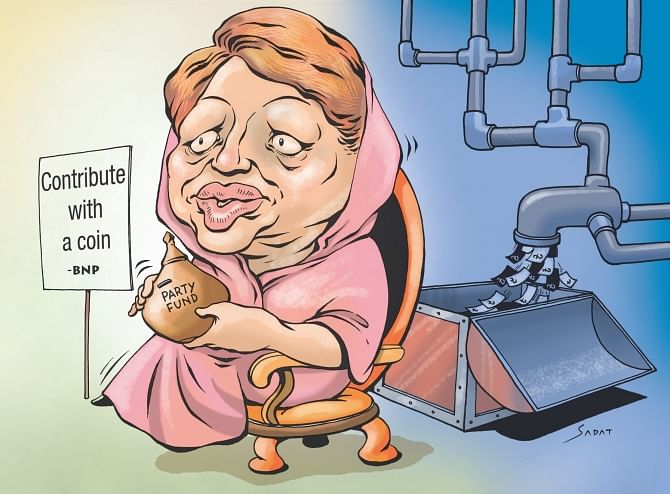Khaleda 'insolvent' to clear party fee
Khaleda 'insolvent' to clear party fee
BNP banks on undocumented donations; leaders follow suit

BNP Chairperson Khaleda Zia has not paid a single penny in monthly fee to her party fund since 2010, according to a recent list prepared by the BNP's central office.
Surprisingly, almost all of the BNP central leaders have followed suit and refrained from paying their monthly fees, though nominal in amount, in the last four years.
Yet, the party has been spending huge amounts of money collected from undocumented sources, enjoying the pervasive culture of a lack of transparency in the political parties' funds that is widely alleged. This malpractice has long been blamed for allowing rooms for corruption.
Khaleda was supposed to pay a monthly fee of Tk 1,000 during her term as an MP in the last Jatiya Sangsad. After expiry of the ninth parliament's tenure last January, she would have to pay the same amount of monthly fee as an ex-officio member of her party's national standing committee. But again she refrained from doing so.
Thus, the BNP supremo herself has repeatedly ignored the decision taken at her party's national council in December 2009 that made it mandatory for the lawmakers and the central leaders of the organisation to pay their monthly fees regularly.
Asked, Khaleda's tax counsel Ahmed Aazam Khan told The Daily Star that the BNP chief couldn't pay the fees due to her financial crisis as she currently faces restrictions in drawing money from her bank accounts.
During the regime of the military-backed caretaker government, the National Board of Revenue (NBR) in 2007 froze all eight bank accounts she had on charges of financial anomalies. Later in 2009, it allowed her to draw not more than Tk 50,000 in a month from two of the accounts each.
Aazam, also an adviser to the BNP chairperson, said she would pay all her dues once the NBR unfroze her other six accounts.
Asked about his own dues, Aazam said he could not pay the fees due to his insolvency. “I have sought time from the party. As soon as I have money, I will pay all the outstanding fees.”
The story doesn't end here. Almost all the BNP lawmakers of the ninth JS and more than 400 leaders and members of the national standing committee, national executive committee, advisory council, vice-chairmen and secretaries also dodged the fees regularly.
There are only a few exceptions, however. For instance, former speaker Jamiruddin Sircar, a standing committee member, cleared all dues from January 2010 to July 2014 by paying Tk 67,000 through a cheque in July, sources in the BNP's central office said.
They said a few other leaders also cleared their dues last July. Though they claim to have regularly contacted leaders requesting them to pay the fees, they got little response.
About the contribution of the grassroots to the party's central fund, they said the amount was not significant.
Contacted, BNP standing committee members MK Anwar, Tariqul Islam and Lt Gen (retd) Mahbubur Rahman stressed the need for paying the monthly fees regularly for smooth functioning of the party and said they would clear their dues very soon.
According to the BNP's constitution, the party fund is constituted by the fees and donations of members and well-wishers of the party.
The 2009 national council of the party fixed Tk 100 as the monthly fee for a national standing committee member, Tk 500 for a vice-chairman and an adviser to the BNP chief, Tk 300 for a secretary and Tk 100 for a member of national executive committee.
In the last four years, the party has been able to collect only Tk 26.68 lakh in monthly fees till March this year while the outstanding amount is Tk 40 lakh.
This means, the party has on an average collected less than Tk 7 lakh a year only.
However, their expenditures were astonishingly higher than their income.
In 2012, BNP's income stood around Tk 1.8 crore whereas it spent nearly Tk 2.27 crore.
In its latest audit report submitted to the Election Commission on August 14, the BNP showed its earning at a little over Tk 76 lakh in 2013 while the expenditure was Tk 2.27 crore.
This also depicts a major slump in its earning in 2013 from the previous year.
When BNP's Joint Secretary General Ruhul Kabir Rizvi Ahmed came out after submitting the audit report, journalists asked him how they had met the deficit.
In reply, he said the money had been arranged from earlier savings of the party fund.
He also said fees received from the party leaders at all levels are the main source of BNP's income.
But the picture of fee collection against the expenditures puts in question what he said.
A senior BNP leader, on condition of anonymity, said they collect donations from party leaders and well-wishers ahead of any big events like rallies, processions and hartals. And all these donations remain undocumented. He claimed other major parties do the same.
The discrepancy between the income and the expenditure of the BNP only mirrors the lack of transparency in fund management that exists in the major political parties of the country.
Centre for Policy Dialogue on May 17 released a study, saying political parties in their constitutions mention membership fees, donations and income from assets as sources of funding, but in practice the funds are collected from a variety of non-transparent sources.
“Funds are mostly provided by business men and remain undocumented. This builds a collusive compact between politicians and businessmen and eventually leads to corruption,” said political scientist Prof Rounaq Jahan, who led the study.
None of the successive governments has taken any step to bring transparency in the parties' income and expenditure.
The EC in 2011 had moved to introduce state funding system to bring transparency in election expenditures of the parties. It had also drafted a law to this end. But the move never saw the light.